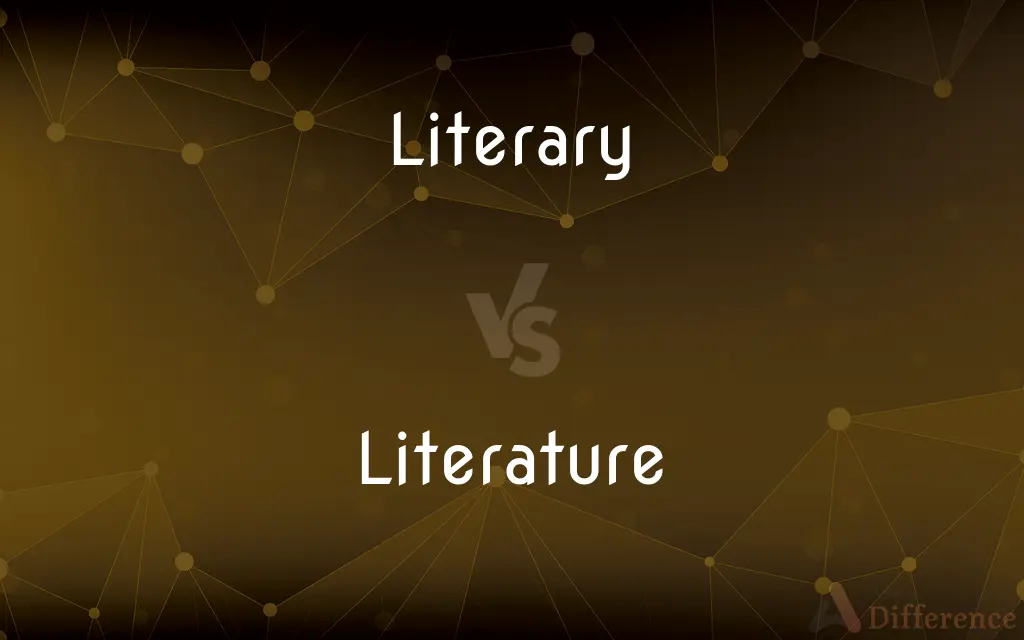Literary vs. Literature — What's the Difference?
By Tayyaba Rehman — Updated on August 18, 2023
Literary refers to matters related to writing, studying, or appreciating literature. Literature encompasses written works, particularly those with artistic and intellectual value.

Difference Between Literary and Literature
Table of Contents
ADVERTISEMENT
Key Differences
Literary acts as an adjective describing things pertaining to literature. Literature is a noun that describes a collection or body of written or printed works. When one reads a literary magazine, they're exploring a publication dedicated to literature.
Literary is used to describe things that have the qualities of literature or are related to literature. Literature, on the other hand, represents the actual content - the written works. A literary analysis is a deep study of a piece of literature.
Literary is often a qualitative descriptor, expressing the nature or quality of something in relation to literature. Literature encompasses a wide range of works, from fiction to non-fiction, from poetry to prose. A literary festival celebrates the world of literature.
Both literary and literature derive from the Latin word "littera", meaning letter. However, literary, as an adjective, describes characteristics or attributes, while literature stands as a body of works. A literary style is the manner of writing employed in a piece of literature.
Literary serves to qualify or categorize aspects related to literature, making it contextual. Literature stands as the foundation of any culture, reflecting its values, beliefs, and stories. One can have a literary inclination, meaning an inclination towards literature.
ADVERTISEMENT
Comparison Chart
Part of Speech
Adjective
Noun
Function
Describes things related to writing
Represents written works
Derived From
Latin word "littera"
Latin word "littera"
Usage Example
Literary analysis
World literature
Contextual Use
Qualitative descriptor
Body or collection of works
Compare with Definitions
Literary
Relating to the writing or study of literature.
Her literary interests include poetry and drama.
Literature
Written works, especially those regarded as having artistic or intellectual value.
She studied the literature of the Renaissance period.
Literary
Relating to writers, or the profession of literature.
A literary man
Literature
Materials printed or written on a particular subject.
The library has an extensive collection of medical literature.
Literary
Versed in, or acquainted with, literature; occupied with literature as a profession; connected with literature or with men of letters; as, a literary man.
In the literary as well as fashionable world.
Literature
Printed matter used to advertise products or give advice.
The tourist office has free literature on local attractions.
Literary
Specialized or restricted in usage to literature.
Literary devices are tools writers use to convey their messages.
Literature
Literature broadly is any collection of written work, but it is also used more narrowly for writings specifically considered to be an art form, especially prose fiction, drama, and poetry. In recent centuries, the definition has expanded to include oral literature, much of which has been transcribed.
Literary
Of, relating to, or dealing with literature
Literary criticism.
Literature
The body of works produced by a particular culture, time, or genre.
He's an expert in ancient Greek literature.
Literary
Bookish.
Literature
The body of written work produced by scholars or researchers in a given field
Medical literature.
Literary
Concerning the writing, study, or content of literature, especially of the kind valued for quality of form
The great literary works of the nineteenth century
Literature
The body of all written works.
Literary
(of language) associated with literary works or other formal writing; having a marked style intended to create a particular emotional effect
The script was too literary
Literature
Written fiction of a high standard.
However, even “literary” science fiction rarely qualifies as literature, because it treats characters as sets of traits rather than as fully realized human beings with unique life stories. —Adam Cadre, 2008
Literary
Knowledgeable of literature or writing.
Literature
Published writings in a particular style on a particular subject;
The technical literature
One aspect of Waterloo has not yet been treated in the literature
Literary
Appropriate to literature rather than everyday writing.
Literature
A body of written or printed works related to a particular field or subject.
Literary
Of or pertaining to letters or literature; pertaining to learning or learned men; as, literary fame; a literary history; literary conversation.
He has long outlived his century, the term commonly fixed as the test of literary merit.
Literature
Written works, especially those considered of superior or lasting artistic merit
A great work of literature
Literary
Of or relating to or characteristic of literature;
Literary criticism
Literature
The body of written works of a language, period, or culture.
Literary
Knowledgeable about literature;
A literary style
Literature
Imaginative or creative writing, especially of recognized artistic value
"Literature must be an analysis of experience and a synthesis of the findings into a unity" (Rebecca West).
Literary
Concerning the writing, study, or content of literature, especially of the kind valued for quality of form.
His literary achievements are recognized globally.
Literature
The collected creative writing of a nation, people, group, or culture.
Literary
Of or relating to writers or the profession of literature
Literary circles.
Literature
Learning; acquaintance with letters or books.
Literary
Versed in or fond of literature or learning.
Literature
The collective body of literary productions, embracing the entire results of knowledge and fancy preserved in writing; also, the whole body of literary productions or writings upon a given subject, or in reference to a particular science or branch of knowledge, or of a given country or period; as, the literature of Biblical criticism; the literature of chemistry.
Literary
Appropriate to literature rather than everyday speech or writing.
Literature
The class of writings distinguished for beauty of style or expression, as poetry, essays, or history, in distinction from scientific treatises and works which contain positive knowledge; belles-lettres.
Literary
Bookish; pedantic.
Literature
The occupation, profession, or business of doing literary work.
The origin of all positive science and philosophy, as well as of all literature and art, in the forms in which they exist in civilized Europe, must be traced to the Greeks.
Learning thy talent is, but mine is sense.
Some gentlemen, abounding in their university erudition, fill their sermons with philosophical terms.
Literary
Relating to literature.
Literary fame
A literary history
Literary conversation
Literature
Creative writing of recognized artistic value
Literary
Appropriate to literature rather than everyday speech or writing;
When trying to impress someone she spoke in an affected literary style
Literature
The art or occupation of a literary writer.
Literary
Familiar with or knowledgeable about literature.
She's very literary and loves discussing classic works.
Literature
Printed material
Collected all the available literature on the subject.
Literature
(Music) All the compositions of a certain kind or for a specific instrument or ensemble
The symphonic literature.
Literature
(usually preceded by the) All the papers, treatises, etc. published in academic journals on a particular subject.
Literature
The humanistic study of a body of literature;
He took a course in Russian lit
Literature
The profession or art of a writer;
Her place in literature is secure
Common Curiosities
What is the primary difference between literary and literature?
Literary is an adjective that describes things related to literature, while literature is a noun referring to a collection of written works.
Is all writing considered literature?
Not necessarily; literature often refers to written works with artistic or intellectual value, distinguishing it from more mundane or functional writing.
What might a literary event entail?
A literary event might involve discussions, readings, or presentations related to literature, authors, and related topics.
Can something be described as "literary" even if it isn't a written work?
Yes, for instance, a film can have a "literary quality" if it is deeply narrative or reminiscent of classic literature.
What types of works fall under the umbrella of "literature"?
Literature can encompass novels, poems, plays, essays, short stories, and more, especially those with artistic or intellectual significance.
Can "literary" and "literature" be used interchangeably?
No, "literary" describes attributes or qualities related to literature, while "literature" refers to actual written works.
How do literary critics differ from general readers?
Literary critics apply specific methodologies and theoretical frameworks to analyze and interpret literature, while general readers might approach literature more for pleasure or personal interpretation.
What's the significance of studying literature?
Studying literature allows individuals to understand cultural, historical, and personal human experiences, enriching one's worldview and empathy.
How can something be termed as "literary fiction"?
Literary fiction refers to works that prioritize artistry, character depth, and style over plot-driven narratives, often providing deeper insights into the human condition.
Are literary devices exclusive to literature?
No, while literary devices like metaphors or alliteration are commonly found in literature, they can also be present in speeches, movies, or other forms of communication.
Share Your Discovery

Previous Comparison
Unexpectedly vs. Unexpectantly
Next Comparison
Redress vs. AddressAuthor Spotlight
Written by
Tayyaba RehmanTayyaba Rehman is a distinguished writer, currently serving as a primary contributor to askdifference.com. As a researcher in semantics and etymology, Tayyaba's passion for the complexity of languages and their distinctions has found a perfect home on the platform. Tayyaba delves into the intricacies of language, distinguishing between commonly confused words and phrases, thereby providing clarity for readers worldwide.














































